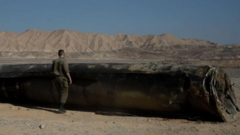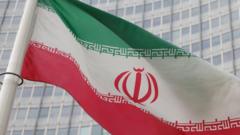The ongoing discussions between the Trump administration and Iran over nuclear capabilities mirror prior challenges faced during Obama's tenure, as both leaders grapple with the complexities of allowing Iran to produce nuclear fuel while avoiding conflict.
Trump’s Iran Nuclear Negotiations: A Repeat of Past Challenges

Trump’s Iran Nuclear Negotiations: A Repeat of Past Challenges
President Trump finds himself amid tough negotiations regarding Iran's nuclear program, facing the same dilemmas that characterized the Obama administration's approach.
The Trump administration is currently engaged in tense negotiations with Iran concerning their nuclear program. The core issue at stake is whether the U.S. will permit Iran to produce nuclear fuel to reach a diplomatic agreement, veering away from the risk of a military confrontation in the Middle East. Trump and his special envoy, Steve Witkoff, face a significant hurdle as Iran insists on maintaining its uranium enrichment capabilities. This insistence could jeopardize the anticipated agreement that Trump once believed was imminent.
This political dilemma echoes the one confronted by President Barack Obama a decade ago. At that time, Obama's administration reluctantly accepted that to forge a nuclear deal, Iran would need to retain some level of nuclear fuel production, thereby allowing its centrifuges to function. Although the 2015 deal successfully contained Iran's nuclear ambitions for three years, most congressional Republicans, and some Democrats, were vehemently opposed to it. Subsequently, Trump withdrew from the agreement, resulting in Iran's compliance being rendered moot.
The Trump administration finds itself navigating the same contentious waters experienced by its predecessor. Similar to Obama, Trump is likely to encounter significant pushback from Iranian hard-liners in the U.S. and figures like Israeli Prime Minister Benjamin Netanyahu, who has advocated for a pre-emptive military strike on Iran's nuclear facilities. Wendy Sherman, the chief negotiator in the 2015 agreement, remarked on the parallels, noting the strong opposition from Congress and Israeli officials demanding total dismantlement of Iran's nuclear capabilities and zero enrichment.
As negotiations progress, the prospect of a viable agreement remains uncertain, with both historical context and current geopolitical pressures shaping the decision-making landscape for Trump and his team. The challenge is whether they can navigate these sensitive talks without triggering further escalation.





















